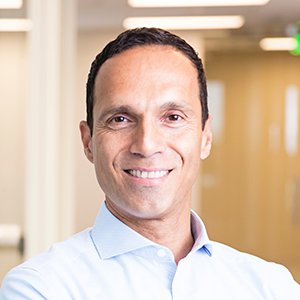PMWC 2021 Virtual: June 14-18
Precision Medicine in the Era of a Pandemic Recovery
PROGRAM
Day 1 (June 14)
Track 1: Emerging Therapeutics
9:50 AM (PST) PMWC Opening Words
9:55 AM (PST) Track Chair Opening Words
10:00 AM (PST)
SARS-CoV-2 Vaccines: Updates on Recent Developments and RWD/RWE Results
The evolution of our understanding of COVID-19 since its first appearance has contributed essential learnings to efficient and targeted vaccine development. We will hear from leading vaccine developers on the status and future of prophylactic vaccine development and how they plan to incorporate RWD/RWE to meet future challenges.
11:00 AM (PST)
Novel Technologies to Advance Cell Therapies for Cancer
The field of cancer and cell therapy has moved quickly and undoubtedly will continue to do so as we gain an evermore granulated insight into tumor microenvironments and key mechanisms underlying disease genesis and progression. We are at a stage where we can further extend the impact of these insights to advance cell therapy as a viable treatment option for solid tumors. This session will explore the latest developments and innovations of emerging therapeutics in cancer and cell therapy and how they are changing outcomes of cancer treatments.
12:00 PM (PST)
Using Immune Response Information to Develop Therapeutics in New Disease Areas
COVID-19 taught us many painful yet important lessons in 2020. In 2021, we have re-emerged with proof that information about the diversity of immune responses to a disease can help us to better detect and treat that disease. Data at the individual and population level are generating a clearer understanding of how the immune response works resulting in new revelations about how we best fight disease. This session will discuss how valuable data when shared and translated effectively can be best leveraged to enhance therapeutic developments across new disease areas.
Day 2 (June 15)
Track 2: AI & Data Sciences
10:00 AM (PST)
Use of Electronic Health Records to Support a Public Health Response to the COVID-19 Pandemic: A Perspective from US Academic Medical Centers and State Governments
This session will summarize the collective experience of several national organizations in dealing with uncoordinated efforts that result in unnecessary delays in understanding, predicting, preparing for, containing, and mitigating the COVID-19 pandemic in the US. Response efforts involve the collection and analysis of data corresponding to healthcare organizations, public health departments, socioeconomic indicators, as well as additional signals collected directly from individuals and communities. This experience focused on electronic health record (EHR) data, since EHRs can be leveraged and scaled to improve clinical care, research, and to inform public health decision-making. The participating speakers will outline the current challenges in the data ecosystem and the technology infrastructure that are relevant to COVID-19. The infrastructure includes registries and clinical data networks to support population-level analyses. We propose a specific set of strategic next steps to increase interoperability, overall organization, and efficiencies.
11:00 AM (PST)
The Role of Genetics, Environment and Healthcare Systems Unraveled Through International Pandemic-Fighting Initiatives
COVID19 is the first pandemic of the Information Age, where integrated data solutions have proven key to propelling progress in tracking, diagnosing, monitoring, treating, and curbing the otherwise massively devastating outcomes of the ravaging virus. Initiatives spawned by individual countries to harness their own ecosystems, from clinical care to genetic research to mobile phone-based contact tracing, have allowed us to uniquely compare, in real-time, the effectiveness of each approach. In this session we will review experiences from public health and medical genomics leaders who will share their lessons-learned, current best practices, and recommendations for prevention of the next global health crisis.
12:00 PM (PST)
Real-world Evidence Powering Precision Oncology
Partnerships formed across academia, industry, and regulatory agencies are generating meaningful clinical insights that advance precision medicine in the field of oncology. As the breadth of genomic testing increases and the capture of associated clinical data improves, the data transform not only the way we think about the biology and natural history of cancer, but also to improve clinical decision-making, particularly in the case of rare cancers and rare variants in common cancers. This session will review new studies that highlight the broad utility of RWE data sources.
1:00 PM (PST)
Leveraging in silico Patients and AI to Better Design Clinical Trials
Thanks to major advancements in AI and access to high-quality clinico-genomic data streams, it is now possible to create computational models that provide a brand new light on both the biology and causal drivers of disease progression and drug response. Specifically, recent developments in causal AI-fueled with clinico-genomic data are enabling the discovery of markers of differential response, the determination of optimal combinations, and better predicting patient outcomes at the individual patient level. This is ultimately leading to the design of more accurate clinical trials from a patient inclusion/exclusion standpoint as well as create much more effective therapies for market in very competitive landscapes such as immune-oncology, immunology, and neurodegeneration. This panel will highlight advances in these emerging areas and discuss real-life challenges and successes and lessons learned.
2:00 PM (PST)
Integrating Pathology into Multi-omics Cancer Care: Opportunities Beyond Digitalization
The digitalization of Pathology opens many more opportunities beyond transforming daily routine in a digital setting. It enables AI-driven analysis options and the opportunity to integrate pathological images into multi-omic analysis options. In this session, we want to highlight some of these innovations.
Day 3 (June 16)
Track 3: Dx & Molecular Profiling in the Clinic- Part A
Track Chair
10:00 AM (PST)
COVID-19 Testing as a “Screening” Tool in an Endemic Setting
As SARS-CoV-2 evolved from an outbreak in Wuhan to an epidemic so did the response. Sequencing the virus was the basis for diagnostics test development which had its initial challenges of test scaling, deployment, and global distribution. As the epidemic rapidly spread to larger populations and evolved into a pandemic, the development and utilization of treatments and vaccines was the next logical step. As we now embark to the next phase of evolution from a pandemic to an endemic, COVID-19 testing and surveillance may be the only answer moving forward.
11:00 AM (PST)
Enabling Safer and More Cost-Effective Medication Treatment Plans
To understand what new technologies, tools, and infrastructures are needed throughout the healthcare ecosystem to enable safer and more cost-effective medication treatment plans, we first need to understand how the use of pharmacogenomic testing and medication safety, and cost savings programs will alter traditional pharmacy services. This panel – with stakeholders from across various sectors – will dive into this complex question.
12:00 PM (PST)
Scaling Precision Oncology and the Role of Community Hospitals
While the pandemic has absorbed much of the healthcare resources from around the globe, diagnostic and molecular testing for cancer patients has been severely impacted. Compared to 2019, we have seen a reduction of cancer diagnosis by up to 50%, generating a massive backlog. To manage the burden of this backlog and the anticipated need for an increase in cancer diagnostic volume, additional resources are needed to guide the diagnosis and treatment of cancer patients. This panel will discuss potential approaches to overcome this challenge.
1:00 PM (PST)
Achieving Precision Medicine Full Potential Through Community Engagement
Realizing the full potential of precision medicine to transform health care, it must be translated into clinical practice that will meet patient and provider needs in all different communities, settings, and social identities. Rural community clinics and hospitals that serve nearly half the US population have historically been the last to gain access to emerging healthcare technologies. This session will discuss the challenges and approaches to directly engage rural and other underrepresented communities to increase their participation in and access to medical innovations offered by precision medicine.
Day 4 (June 17)
Track 4: Dx & Molecular Profiling in the Clinic- Part B
10:00 AM (PST)
New Variants Detection and Tracking
Genetic variants of the SARS-CoV-2 virus have been emerging and circulating around the world. Scientists are routinely monitoring for new variants through sequence-based surveillance, laboratory studies, and epidemiological investigations. Different coronavirus variants can trigger different immune responses, and researchers are only beginning to map their full diversity. Scientists across the globe are racing to understand how these and other variants will influence the pandemic. This session will update on the latest efforts to detect new variants and the different clinical effects that they have.
11:00 AM (PST)
Fireside Chat: Lee Hood, Providence with Francis Collins, NIH
11:45 AM (PST)
Integrated Approaches to Precision Medicine in Cancer
As the playing field for targeted therapies and immuno-oncology treatments continues to broaden, learn how combining different capabilities such as IHC, FISH and NGS can provide greater insights and a more precise diagnosis. Learn about the advancements in Liquid Biopsy and how this can complement tissue-based testing to provide diagnostic results that help clinicians better manage and treat disease. Get insights from both pharma and CDx providers on clinical diagnostic development from discovery, through clinical trials and registration, to global manufacturing and commercialization.
Day 5 (June 18)
Track 5: Transformations in Health Care Delivery
9:45 AM (PST)
Euan Ashley’s overview on his new book: Genome Odyssey
10:00 AM (PST)
FDA and Lessons Learned; How Clinical Data and Clinical Research Will Speed Progress in Precision Medicine Fireside Chat: Ralph Snyderman & Amy P. Abernethy
11:00 AM (PST)
Personalized, Proactive Value-Based Care: Emerging New Models
The confluence of the growth of chronic diseases, the impact of COVID, the emergence of new technologies and the impact of value -based reimbursement are driving major innovations and changes in care delivery. Proactive, personalized, precision, population-based and digitally supported care is emerging and heralding new approaches to health care. This session will capture the elements of these changes and the dynamics of the forces that are driving them. Perspective from care innovators, large providers and payers will be discussed by a panel of key opinion leaders.
12:00 PM (PST)
The Payer’s Perspective on Precision Medicine
Fireside Chat: Keith Yamamoto & Harold Paz
12:30 PM (PST)
Closing Words By Keith Yamamoto

















































































